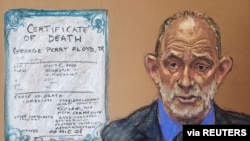The trial of a former U.S. police officer charged with murdering George Floyd in Minneapolis, Minnesota, last year moves toward its close, with defense attorneys presenting more of their case Thursday.
Judge Peter Cahill has said he expects the defense to finish this week, setting up closing arguments as early as Monday.
It is not yet known whether Derek Chauvin will testify in his own defense.
A defense medical expert testified Wednesday that Floyd’s heart condition and drug use played a “significant” role in his death last year, as Chauvin’s defense continued to try to raise doubt about the prosecution’s claim that the policeman alone was responsible for Floyd’s death.
David Fowler, a former Maryland chief medical examiner and forensic pathology expert, told the jury that Floyd’s blood pressure was “out of control” when Chauvin restrained him by pressing his knee on his neck while he lay prone on a city street. Officers had arrested Floyd last May 25 on suspicion of passing a counterfeit $20 bill at a convenience store.
A medical technician testified this week that Floyd, a 46-year-old Black man, had a very high blood pressure of 216 over 160 during the incident that led to his death, which Fowler said was “much higher than I would expect.”
Fowler said that traces of fentanyl and methamphetamine in Floyd’s blood system, as well as his possible “carbon monoxide poisoning” from the exhaust fumes of the police vehicle that Floyd was lying against, also could have contributed to his death.
Defense lawyer Eric Nelson is trying to undercut 11 days of prosecution testimony and evidence that Chauvin, a white man with 19 years on the Minneapolis police force before he was fired in the wake of Floyd’s death, asphyxiated Floyd by cutting the air passage in Floyd’s neck as he repeatedly gasped that he could not breathe.
Prosecution witnesses earlier in the trial said repeatedly that Chauvin violated his police training in the way he restrained Floyd and that he killed Floyd by holding him down for more than nine minutes, continuing even after Floyd appeared to have stopped breathing.
Floyd’s death triggered widespread protests, some of them violent, in the U.S. and overseas against police abuse of minorities.
The trial is moving along at a brisk pace and the defense could wrap up its case Thursday, although it is not yet known whether Chauvin will testify in his own defense. If he does testify, Chauvin would also subject himself to cross-examination from prosecutors asking him why he continued to press Floyd down on the pavement when he was already handcuffed.
Chauvin has pleaded not guilty to murder and manslaughter charges, but if convicted could face years in prison. Three other former police officers who played various roles in detaining Floyd are awaiting trial in the case but their charges could be dropped if Chauvin is acquitted.
Earlier Wednesday, trial judge Peter Cahill rejected Nelson’s bid to dismiss the case against Chauvin and clear him.
Cahill said it was his “duty at this point in the trial to look at the evidence in a light most favorable to the state.” He added that the jury was “free to believe some” witnesses and not believe others.
Fowler’s testimony came after a police use-of-force expert, Barry Brodd, testified Tuesday that Chauvin was “justified” in pinning down Floyd and that the tactic should not be considered as use of deadly force.
Brodd, a key witness for Chauvin who has testified in other high-profile cases for police accused of abusing criminal suspects, said, “It’s easy to sit and judge, in an office, on an officer’s conduct. It’s more of a challenge to, again, put yourself in an officer’s shoes.”
Asked by Nelson whether he thought Chauvin’s restraint of Floyd amounted to deadly force, Brodd replied, “It was not.”
Brodd called the former officer’s actions “objectively reasonable.”
On cross-examination, prosecutor Steven Schleicher, attempted to chip away at Brodd’s conclusions.
The prosecutor won an acknowledgment from Brodd that when Floyd repeatedly gasped, “I can’t breathe,” while lying prone on the street, it was the responsibility of Chauvin to have “situational awareness” of Floyd’s dire condition and back off his restraint of Floyd.








